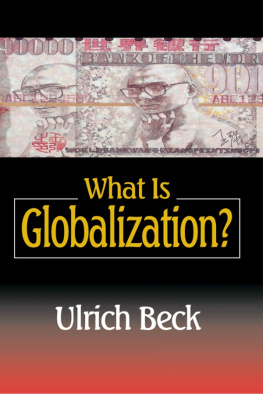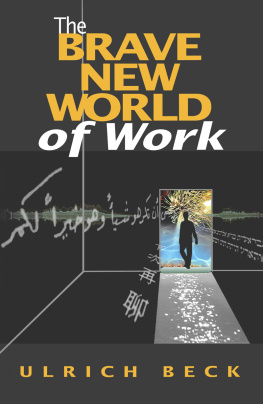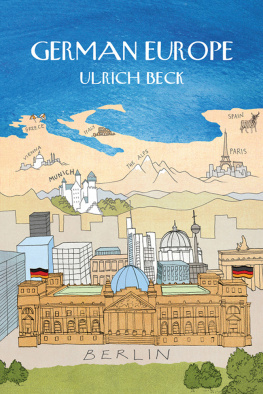Ulrich Beck - What Is Globalization?
Here you can read online Ulrich Beck - What Is Globalization? full text of the book (entire story) in english for free. Download pdf and epub, get meaning, cover and reviews about this ebook. year: 2014, publisher: Wiley, genre: Politics. Description of the work, (preface) as well as reviews are available. Best literature library LitArk.com created for fans of good reading and offers a wide selection of genres:
Romance novel
Science fiction
Adventure
Detective
Science
History
Home and family
Prose
Art
Politics
Computer
Non-fiction
Religion
Business
Children
Humor
Choose a favorite category and find really read worthwhile books. Enjoy immersion in the world of imagination, feel the emotions of the characters or learn something new for yourself, make an fascinating discovery.
- Book:What Is Globalization?
- Author:
- Publisher:Wiley
- Genre:
- Year:2014
- Rating:3 / 5
- Favourites:Add to favourites
- Your mark:
- 60
- 1
- 2
- 3
- 4
- 5
What Is Globalization?: summary, description and annotation
We offer to read an annotation, description, summary or preface (depends on what the author of the book "What Is Globalization?" wrote himself). If you haven't found the necessary information about the book — write in the comments, we will try to find it.
What Is Globalization? — read online for free the complete book (whole text) full work
Below is the text of the book, divided by pages. System saving the place of the last page read, allows you to conveniently read the book "What Is Globalization?" online for free, without having to search again every time where you left off. Put a bookmark, and you can go to the page where you finished reading at any time.
Font size:
Interval:
Bookmark:


Copyright this translation Polity Press.
First published in Germany as Was ist Globalisierung? Suhrkamp Verlag, 1997.
First published in 2000 by Polity Press in association with
Blackwell Publishers, a Blackwell Publishing Company
Reprinted 2000 (twice), 2001, 2002, 2003, 2004, 2005, 2008, 2009
Published with the assistance of Inter Nationes.
Polity Press
65 Bridge Street
Cambridge CB2 1UR, UK
Polity Press
350 Main Street
Malden, MA 02148, USA
All rights reserved. Except for the quotation of short passages for the purposes of criticism and review, no part of this publication may be reproduced, stored in a retrieval system, or transmitted, in any form or by any means, electronic, mechanical, photocopying, recording or otherwise, without the prior permission of the publisher.
Except in the United States of America, this book is sold subject to the condition that it shall not, by way of trade or otherwise, be lent, re-sold, hired out, or otherwise circulated without the publishers prior consent in any form of binding or cover other than that in which it is published and without a similar condition including this condition being imposed on the subsequent purchaser.
A catalogue record for this book is available from the British Library.
Library of Congress Cataloging-in-Publication Data
Beck, Ulrich, 1944
[Was ist Globalisierung? English]
What Is globalization? / Ulrich Beck; translated by Patrick Camiller.
p. cm.
Includes bibliographical references and index.
ISBN 978-0-7456-2125-8 (hb.). ISBN 978-0-7456-2126-5 (pb.)
1. International economic relations. 2. International relations.
I. Title.
HF 1359.B413 2000
337dc21
99-27522
CIP
For further information on Polity, please visit our website: http://www.polity.co.uk
Preface
The purpose of this book is to offer a trenchant introduction that will assist readers facing the thorny paths of the globalization debate: to clarify its ambiguities of fact and value, and to distinguish more clearly than is usually the case between its various dimensions. Another aim is to warn of a number of conceptual pitfalls, but the most important of all is to open up the horizon for political responses to globalization. Two questions, then, each difficult in its simplicity, will be at the centre of attention. What does globalization mean? How can it be moulded politically?
In connection with this essay, two Readers have been produced in German in which the various arguments, conclusions and controversies regarding globalization are documented and presented with the help of classical and more recent texts. The titles of these volumes are: Politik der Globalisierung [Politics of Globalization] and Perspektiven der Weltgesellschaft Kontroversen, Konflikte, Paradoxien [Perspectives for World Society: Controversies, Conflicts, Paradoxes].
I began work on these volumes two years ago, and their completion was made possible above all by a Distinguished Research professorship that I took up at the University of Wales, Cardiff, in the winter semester of 1995-6. Without the extremely stimulating discussions I had with Barbara Adam, Martin Albrow, Jrg Drrschmidt, Anthony Giddens, David Held, Scott Lash, John Thompson, Robin White-Grove, Helen Wilkinson, Brian Wynne and many others but most of all, as ever, with Elisabeth Beck-Gernsheim this book would never have seen the light of day. I would like to express here my deepest gratitude to them all.
Acknowledgements
The author and publisher gratefully acknowledge permission to reprint from the following:
Zygmunt Bauman: from Globalization (Polity Press, 1998), by permission of the publisher.
Charlotte Bretherton: from Universal Human Rights: Bringing People into Global Politics, in C. Bretherton and G. Ponton (eds), Global Politics (Blackwell, 1996), by permission of the publisher.
J. N. Pieterse: from Globalization as Hybridization, in M. Feath- erstone, S. Lash and R. Robertson (eds), Global Modernities (Sage, 1995), by permission of Sage Publications Ltd and the author.
Martin Shaw: from Civil Society and the Media in Global Crises: representing distant violence (Pinter, 1996), by permission of Cassell & Co.
Andreas Zielcke: extract from Der Neue Doppelgnger, in the Frankfurter Allgemeine Zeitung, 20 July 1996, by permission of the Frankfurter Allgemeine Zeitung.
With the peaceful fall of the Berlin Wall and the collapse of the Soviet empire, many thought that the end of politics was nigh as we entered an age beyond socialism and capitalism, utopia and emancipation. In the years since then, however, the ceremonial farewells to politics have become rather more subdued. The current scare-word globalization, seemingly unavoidable in any public statement, points not to an end of politics but to its escape from the categories of the national state, and even from the schema defining what is political and non-political action. For whatever the referent of the new globalization rhetoric (economy, markets, job competition, production, goods and services, financial flows, information, lifestyles), the political consequences of the stage-managed economic globalization risk stand out in sharp relief. Institutions of industrial society which seemed shut tight can be cracked and opened up to political intervention. The premises of the welfare state and pension system, of income support, local government and infrastructural policies, the power of organized labour, industry-wide free collective bargaining, state expenditure, the fiscal system and fair taxation all this melts under the withering sun of globalization and becomes susceptible to (demands for) political moulding. Every social actor must respond in one way or another; and the typical responses do not fit into the old left-right schema of political action.
We may say that what used to be the class question for the workers movement in the nineteenth century is the globalization question for transnationally active enterprises at the turn of the twenty-first century but with the crucial difference that the workers movement acted as a countervailing power, whereas global enterprises have for a long time not been challenged by any other (transnational) power.
Why then does globalization mean politicization? It means this because the staging of globalization permits employers and their associations to disentangle and recapture their power to act that was restrained by the political and welfare institutions of democratically organized capitalism. Globalization makes possible things which, though perhaps always there, remained hidden during the stage of the welfare-democratic taming of capitalism. It means that corporations, especially globally active ones, can play a key role in shaping not only the economy but society as whole if only because they have it in their power to withdraw the material resources (capital, taxes, jobs) from society.
The global operation of the economy is sapping the foundations of national economics and national states, unleashing subpolitics on a quite novel scale and with incalculable consequences. The next objective will be to shunt the old adversary, labour, out of harms way, but above all to serve notice on the ideal aggregate capitalist (as Marx called the
Font size:
Interval:
Bookmark:
Similar books «What Is Globalization?»
Look at similar books to What Is Globalization?. We have selected literature similar in name and meaning in the hope of providing readers with more options to find new, interesting, not yet read works.
Discussion, reviews of the book What Is Globalization? and just readers' own opinions. Leave your comments, write what you think about the work, its meaning or the main characters. Specify what exactly you liked and what you didn't like, and why you think so.














